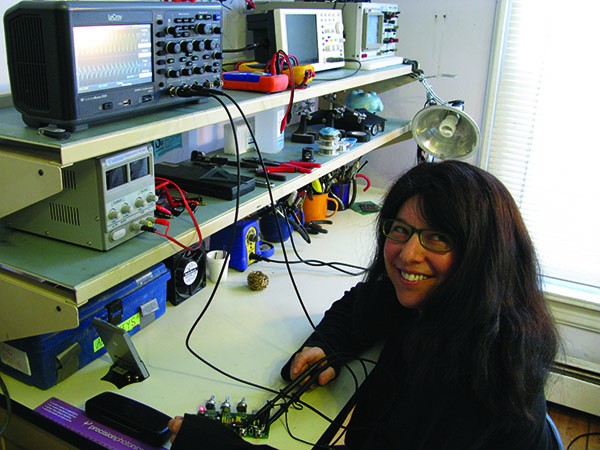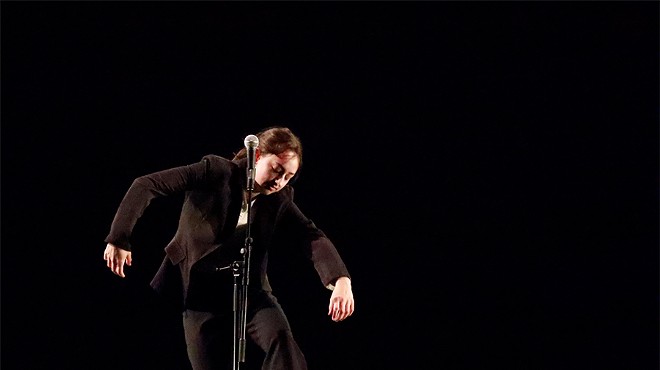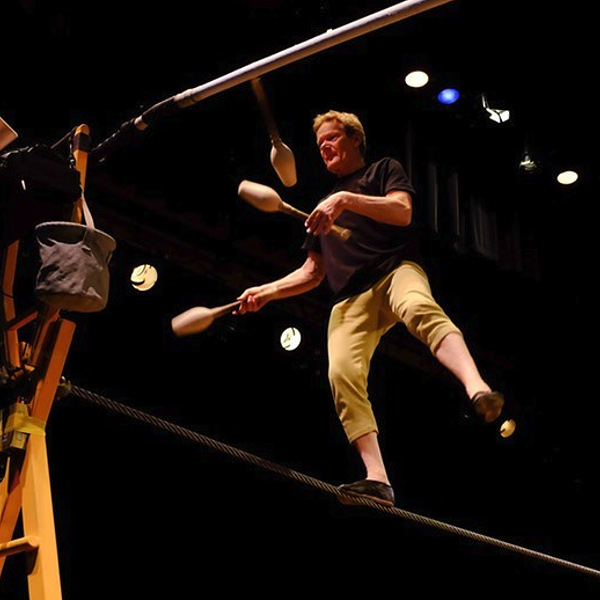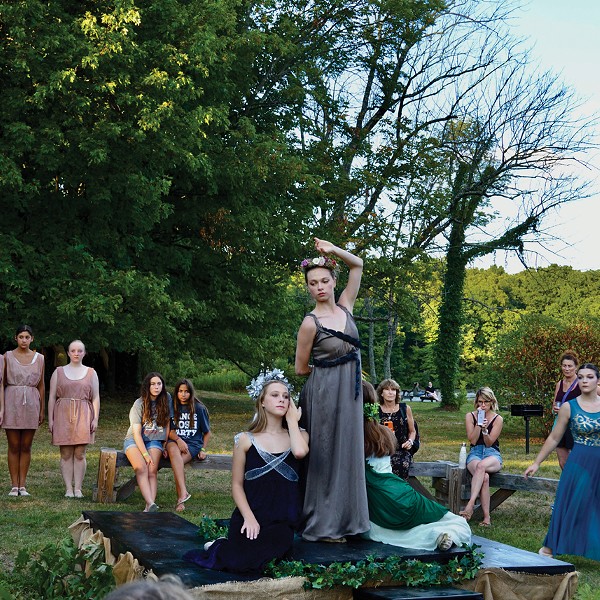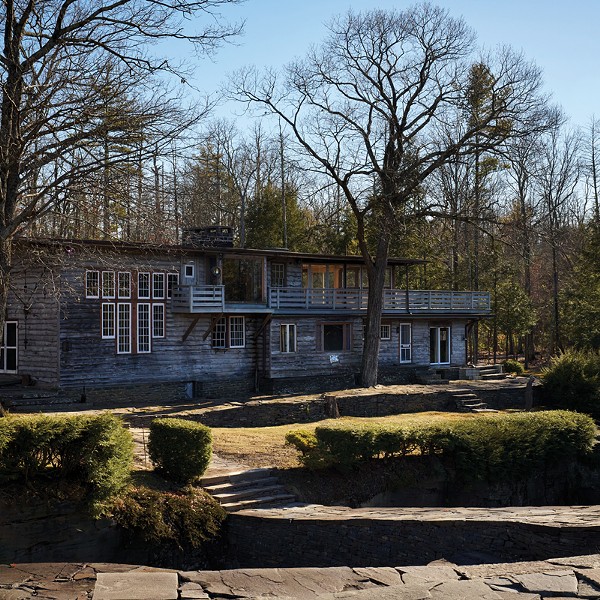
A Kingston resident who works remotely as a programmer for Basecamp's security and performance team, Eileen Uchitelle is part of an economic resurgence that's sprouting up in living rooms, basements, and small offices overlooking the main streets of Kingston, Hudson, Poughkeepsie, and Beacon. Uchitelle, who started her digital career as an intern at Evolving Media Network and got the job at Basecamp after freely contributing to the Basecamp framework, is one of the many programmers who've moved to the Hudson Valley. To help meet others in her field in an area where everyone's spread out and sequestered away in their home offices, she recently co-organized a code developer meet-up in Kingston. "The tech community in the area is growing," she says, noting that all 45 spaces of the meeting were filled.
As a female tech worker, however, Uchitelle is atypical. Women constitute only a tiny percentage of the tech workforce. As the tech sector builds momentum in the Hudson Valley, bridging the gender gap is a key goal.
In the last decade, tech entrepreneurs have been moving to the area from the city, attracted to the Hudson Valley's affordability and excellent quality of life. (It's a trend Ulster County's Economic Development Office is hoping to capitalize on, by launching a campaign targeting the sector that included a free "red carpet" tour of the county September 12 for tech entrepreneurs it hopes to lure to the area.) The Hudson Valley Tech Meet-Up, launched just over a year ago by the owners of Kingston-based Evolving Media Network and Mark + Phil, a digital marketing company based in Poughkeepsie, has nearly 600 members. Video conferencing is just one of the tools enabling companies such as Hale Advisors, a digital marketing consultancy firm focused on the health care industry, to be based in Uptown Kingston—more than 90 miles away from its nearest client. "We do a lot of driving," says co-owner Beth Bengtson.
But most of the tech newcomers are men. Hale Advisors is one of the few women-owned tech firms in the area, and Bengtson says she's noticed the events at the Hudson Valley Tech Meet-Up, while well attended, "are very male dominated." "Part of our mission as a women-owned company is to support other women," says Bengtson's business partner Zoe Dunn, who notes that the firm donates one percent of its revenue to women-focused charities.
The gender inequity that exists regionally is a mirror of a nationwide demographic. While women constitute 57 percent of the labor force, only 26 percent are employed in computer and mathematical occupations, according to the Department of Labor. More women are earning undergraduate degrees than men—57 percent, to be precise—but only 14 percent earn a computer science degree; that's a shocking reduction from 1985, when 37 percent of computer science degrees were earned by women, according to an article in the October 29, 2013 Atlantic titled "We Need More Women in Tech: The Data Prove It." Female software developers, computer and information systems managers, and computer programmers earn roughly 85 percent of what their male counterparts make.
Women are missing out of an economic sector that's booming. Four years ago, when Hale Advisors was launched, "digital was something outside of everything, which gave us the opportunity to become experts in a niche area," says Dunn. "Now digital is everywhere, and it is challenging an industry like health care to modify their communications leveraging many digital platforms, such as social media, mobile, multichannel, multi-screen, desktop, and wearable devices. There's even a chip that's imbedded in a pill to help with adherence to taking your meds."
Though they are in a small minority, several of the women in the tech industry in the Hudson Valley are high profile, speaking at conferences, forming groups, and actively reaching out to women in their profession. One is Nitya Narashimhan, a software engineer who grew up in India, earned her PhD in California, and worked as a researcher at Motorola in Chicago before relocating to Hopewell Junction with her husband, an IMBer, in 2009. Narashimhan started a Google Developer Group (GDG) in the Hudson Valley, inspired by the GDG in New York City, which she had regularly attended and has 5,000 members, making it the second-largest GDG in the nation. Google Glass and other relatively new platforms and are presented to local developers eager to create new applications. The Hudson Valley GDG sponsors a monthly hack night—people learn how to write Polymer, Meteor, JavaScript, or other code. Narashimhan, who works as a consultant and teaches at SUNY New Paltz and Dutchess Community College, is also planning a hackathon—a meet-up in which people build an app over the course of 48 hours—in the Hudson Valley this fall.
Narashimhan is committed to increasing the number of women in the field. She's run a summit for female software engineers in New York City for the past two years. As the mother of a young son, she's also working to promote computer science classes at the elementary school level. "When I do the GDG meet-ups outside the university, it's very rare for women to show up," she says. "My hope is that women will be running this thing. It would be wonderful if we could have women coding groups." She will be one of the featured speakers at the first annual Catskill Conf, held October 23-25 at the Ashokan Center. (See sidebar.)
Sabrina Schutzsmith, co-owner of Mark + Phil with her husband, Daniel, which helps socially responsible companies and organizations strategize their marketing and philanthropy, said she hopes to start a Women Tech Meet-Up. "I want to create a sisterhood to get people to realize women should work in technology and remain in technology because it's a lucrative business and it's great to be creative," she says.
Kingston-based Sophi Kravitz is that rare anomaly, a female electrical engineer based in the Hudson Valley. (Even more unusual, she is also a college English major who worked in special-effects makeup for movies before an allergy to the plastics caused her to change careers.) Five years ago, she started her own consultancy, MIX-E LLC. Now she works for small manufacturing companies located in the region on product design and other projects. For example, she recently worked with a gaming company to reverse engineer a wand in order to put it into another video game, and she also serves as a technical advisor for a soft robotics company based in Garrison. She developed a product that was sold to the National Institute of Health and has a full-time job writing articles and overseeing a contest for online site Hackaday. She contributes articles to another engineering website, Element 14, and has a sideline career as a visual artist (among her commissions was an installation for this year's Burning Man Festival). "There are massive opportunities in all of the tech fields," Kravitz says. "Supply is far smaller than the demand. When I go to meet a new client or attend a job interview, statistically the odds are in my favor."
The tiny number of women electrical engineers—a mere two percent of the total—"is surprising and horrifying," Kravitz says. She mentors young women and organizes conferences—including one in San Francisco this November—in an effort "to constantly change that ratio." She surmises the lack of interest by the young in general for the engineering and tech fields is partly due to the requisite long-term investment and hard work. "For any young person it is intimidating to go into a field that is difficult," Kravitz says. "It can take five to six years at an engineering firm before you feel adequate."
Kravitz could make more money in the big city, but she much prefers the quality of life and cheaper costs of the Hudson Valley, and the flexibility of being master of her own time. Plus, "the tech community here is pretty good," she says. "There's a hacker space in Highland that meets Tuesday night. It's a space where people go to have a community around building things with electronics. I have an excellent time and meet interesting and smart people."
Calandra Cruickshank is cofounder and CEO of StateBook, a website that aggregates statistics on municipalities to facilitate site placement by companies. Now based in Kingston, she raised her kids and ran a B&B from her home in Shandaken before co-founding a couple of startups that raised money for nonprofits by printing coupons for food items. Her current company has a database that covers every county in the US and also has a membership of more than 270 economic development organizations, who pay to add their own content to the site.
Cruickshank could run her company from anywhere and is thrilled to be able to live and work in the Hudson Valley. However, she is seeking venture capital from investors in New York to support her growing company, and she's been told her potential investors might require her to move there. "In a smaller community you can have a thriving innovative ecosystem that supports the innovation of new companies, but once the company is growing and scaling and needs capital infusion, you have to go to Boston, New York, or San Francisco to get the money," Cruickshank says. "My hope is that because I have the talent pool and it's a growing culture, I'll be able to stay." Cruickshank added that perhaps the biggest obstacle for female tech entrepreneurs is raising capital. "There's a very large percentage of women starting companies and a very small percentage of venture capital is going toward them," she says. "Women have to be more creative. Crowdfunding is one way around this."
While the tech meet-ups in New York City tend to be more cutting-edge than the meet-ups in the Hudson Valley, Narashimhan is optimistic that the industry will continue to evolve up here in the hinterlands, with more companies setting up shop and more women entering tech. "Sometimes it's easier to have change happen in smaller communities than big ones," she says. "In the Hudson Valley, you build relationships. I know everyone up here. There's a motion toward getting things to happen. We're at the tipping point of how to go from awareness to action."
Catskills Conf
From October 23 to 25, the first annual Catskills Conf will be held at the Ashokan Center, a three-day mash up of tech presentations, artisan demonstrations, hiking, live music, locally produced food, and creative brainstorming. "While the word 'conference' implies pure learning tracks, the Conf will have more open time and be a lot more hands on," says Kale Kaposhilin, co-founder of Evolving Media Network and one of the Conf sponsors.
Attendees paying the $795 ticket ($1,495 for a family of four) hail from as far away as Germany, Canada, and the West Coast. Promoting diversity is one of the Conf's goals, and the organizers are offering a free or reduced ticket to members of underserved student populations. Encouraging diversity is not only a moral imperative, but it's also smart because it stimulates more ideas. "We believe if everyone is involved in the conversation, the world benefits," says Kaposhilin.
The choice of speakers includes John Resig, creator of the JQuery JavaScript Library, a project that seeks to develop optical recognition technologies to help foundations and museums combine their databases into a single massive system; Maurya Couvares, cofounder and executive director of ScriptEd, which uses volunteers to teach computer science and web development in New York City public schools in underserved areas and then places the graduates in paid internships doing coding; Dennis Crowley, cofounder of Foursquare and named one of Fortune's "40 Under 40" in 2010 and 2011; and Kate Hartman, a Toronto-based artist, technologist, and educator whose work spans the fields of physical computing, wearable electronics, and conceptual art (she is cocreator of Botanicalls, a system that lets thirsty plants place phone calls for human help).
Besides the talks, there'll be cooking and blacksmithing demonstrations, a foraging expedition, hiking in the woods, and fireside gatherings—"an intersection of makerism and technology and innovation," as Kaposhilin describes it. "Our goal is to highlight wonderful work and the awesomeness of the Hudson Valley," says Kaposhilin. "We want to get those same people together over dinner and do stuff. Magic can happen in such circumstances." The ticket price includes lodging in bunk beds at the Ashokan Center (a hotel room is also an option), all meals, drinks, presentations, and activities. Attendance is limited to 130 participants.
Kaposhilin, who's also been working with Ulster County on its recent economic development initiative targeting tech entrepreneurs from New York City, says the biggest challenge in the region is the lack of tech resources and population density. "We need to create coworking spaces so that tech startups can flourish," he says. "We need to create an ecosystem. We're working with other stakeholders so our tech startups and businesses can flourish. We don't have a cluster, but what we do have is an incredible population of diverse creative talent. We need events and programming so people can collaborate with each other." The Catskills Conf will hopefully help jumpstart that effort. For more info, visit Catskillsconf.com.







